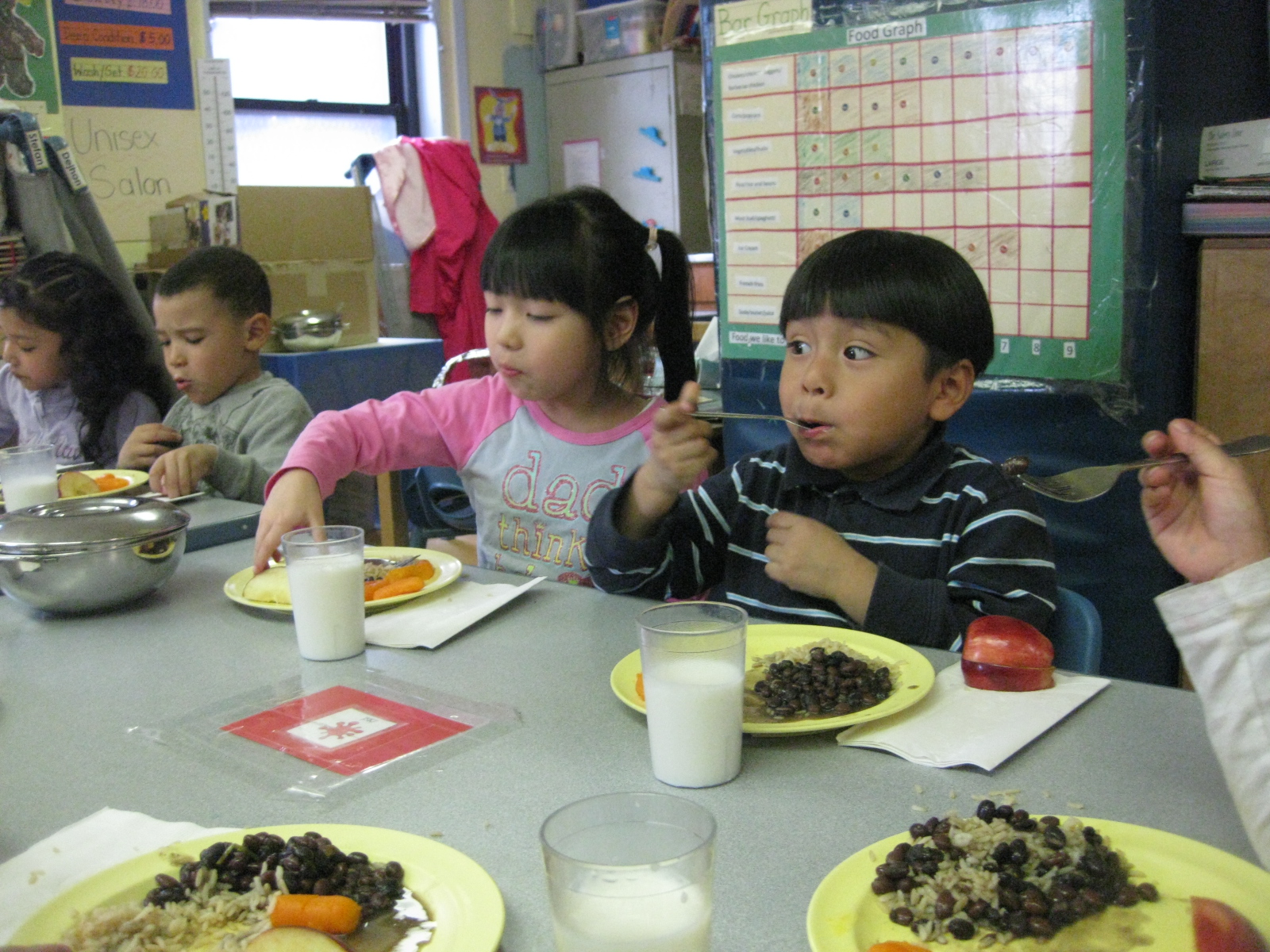New Report Examines Institutional Meals Served by New York City

photo source
NEW YORK, N.Y. – (February 13, 2014) A new report The Public Plate in New York City: A Guide to Institutional Meals (www.nycfoodpolicy.org/research) examines the health and economic impact of the more than 260 million meals New York City serves each year in public schools, public child care and senior citizen programs, homeless shelters, jails, public hospitals, and other settings.
The report, by the New York City Food Policy Center at Hunter College and the City University of New York School of Public Health, analyzes the multiple influences on the city’s institutional meals programs, identifies challenges, and highlights emerging solutions. It recommends 13 actions the City of New York can take to continue to improve the nutritional quality and economic and environmental impact of the meals served by the ten city agencies studied. It also suggests steps the city can take to leverage its institutional meals programs to promote economic development and reduce waste.
The City spends almost half a billion dollars a year for the food served on the public plate and the labor to prepare these meals and snacks. At least 10,000 people work to produce and serve these meals, not including the suppliers and distributors, truck drivers, administrators, farmers and food processors, who are also involved in this vast system. Some NYC meals are planned, prepared and served directly by municipal agencies in public institutions such as schools and jails. Others are offered by independent nonprofit organizations with which the City contracts, such as senior centers or child care programs.
In the last seven years, NYC has made substantial progress in improving its institutional food programs and weaving them into a system that can achieve health, economic, environmental and social justice goals. With a new Mayor and City Council, the City now has an opportunity to take a fresh look at whether its investment in the public plate is reaching their full potential to reduce food insecurity and diet-related diseases and promote economic development and environmental sustainability. This report suggests specific ways in which the new Mayoral administration and City Council can further improve institutional food.
These recommendations are:
- Strengthen the Mayor’s Office of Food Policy
- Update the NYC Food Standards and continue to assist agencies to achieve full compliance
- Improve the data collection, analysis and reporting required for NYC Food Standards compliance and food expenditures
- Expand participation in federally funded child nutrition programs in order to increase food security for NYC children, generate additional food service jobs, and stimulate the NYC economy.
- Advocate for improvements in federal and state food assistance programs.
- Conduct systematic assessment of the discrepancies between published menus and actual offerings in a variety of institutional settings, and assess the palatability and appeal of meals as served.
- Conduct a careful comparison of prices obtained by contractors using group purchasing organizations such as Essensa, Marketplace and GPS.
- Foster a culture of consumer participation in menu planning and decision making.
- Build the capacity of foodservice workforce, especially in more decentralized foodservice systems, to make good purchasing and production decisions that favor the health and well-being of the populations served.
- Increase the proportion of local food served on the public plate.
- Build the market for healthy, fresh, local produce by continuing and expanding efforts to integrate food with the curricula of schools, day care centers, after school programs, continuing education, and other institutional settings.
- Facilitate and nurture the establishment of local, mission-driven, community based catering and food processing organizations.
- Conduct a survey of kitchen facilities and equipment needs and work with CBOs and public agencies to secure the funds necessary for expansion of capacity.
By using the procurement and market power of its public plate strategically, New York City can make healthier, more affordable food available to all New Yorkers, especially our most vulnerable residents, as well as provide new opportunities for job creation and economic growth.
The full report, executive summary and supplement are available at https://nycfoodpolicy.org/research/
This report was prepared by the Public Plate Working Group, based at the New York City Food Policy Center at Hunter College and the City University School of Public Health. Its members are Sara Quiett Barton, Nicholas Freudenberg, Jan Poppendieck, Ashley Rafalow, Emma Tsui and Jessica Wurwarg. The New York City Food Policy Center at Hunter College develops intersectoral, innovative and effective solutions to preventing diet-related diseases and promoting food security in New York and other cities. The Center works with policy makers, community organizations, advocates and the public to create healthier, more sustainable food environments and to use food to promote community and economic development. The Center aims to make New York a model for smart, fair food policy. Its faculty co-directors are Distinguished Professor of Public Health Nicholas Freudenberg and Professor of Sociology Emerita Jan Poppendieck. For more information, to subscribe to the Center’s e-newsletter contact info@nycfoodpolicy.org. For questions or comments on the report, contact Nicholas Freudenberg at nf@nycfoodpolicy.org
Download this press release in PDF


